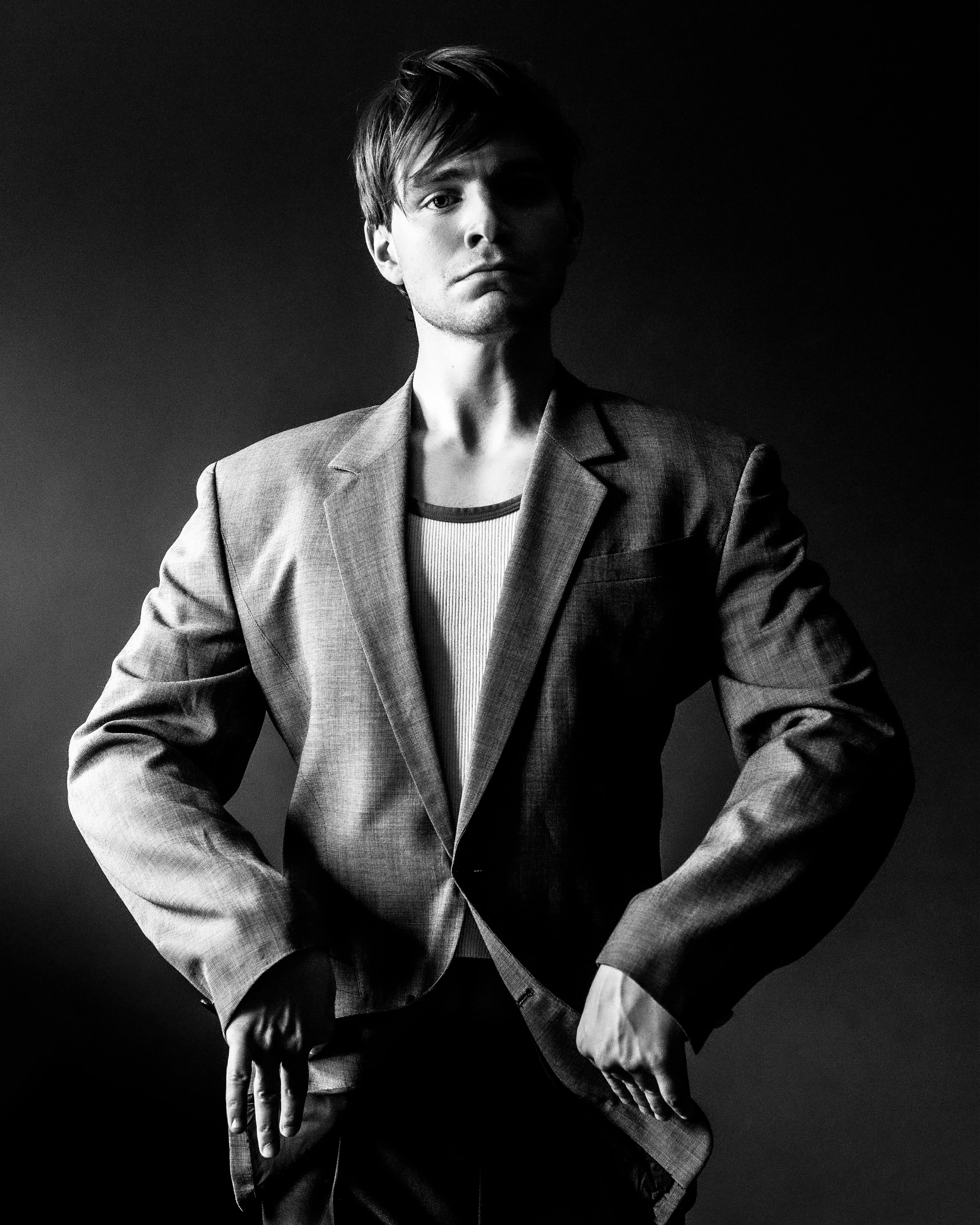
Vintage jacket by Mugler from Cherry Vintage. Vintage top, stylist’s own. Pants by Ouer.
Andrew Burnap Asks the Tough Questions
On December 3, 1960, Alan Jay Lerner and Frederick Loewe’s lavish Camelot opened on Broadway with a standout cast including Richard Burton, Julie Andrews, and Robert Goulet. A retelling of the epic of King Arthur, the show marked the end of Broadway’s midcentury Golden Age of blockbuster musicals but the beginning of a new era in American society as it became an emblem of the Kennedy administration, a brief yet momentous period of youthful optimism and idealism that came to a tragic end less than three years later. Camelot lives on today as a reminder of that halcyon long-ago era—one that can feel as remote in our dark and divided times as the days of King Arthur himself—but Andrew Burnap, who is now starring in a new revival at Lincoln Center Theatre, says that the show’s questions about might vs. right and the responsibilities that come with power are eternal. “The words that Arthur always returns back to are civility, honor, decency, and most of all justice. Those are things that every generation struggles with, no matter the ground that is gained,“ he says. “I think, unfortunately, the dance that we are destined to do forever makes Camelot a timely piece whenever you decide to stage it.“

To be fair, this latest production of Camelot—which also stars Phillipa Soo as Arthur’s queen Guenevere and Jordan Donica as Lancelot, the third corner of their love triangle, and is nominated for a Tony for Best Revival of a Musical this weekend—has the added advantage of Oscar, Emmy, and Golden Globe winner Aaron Sorkin’s newly updated book, which strips away the magic and mysticism and lays bare its nuanced examination of politics and power. In the show, Arthur—who famously became king of Britain after fulfilling a prophecy by extracting the sword Excalibur from a stone—is not so much divinely destined as he is in the right place at the right time, and Sorkin unpacks the monarch’s imposter syndrome as he poses questions to himself that Burnap says any artist would be familiar with. “Something that I grapple with every project I get is being so excited that I get it,“ he offers, “and then when it comes to doing it, it’s like, ’Am I actually good enough to do this? Am I worthy of this?’“
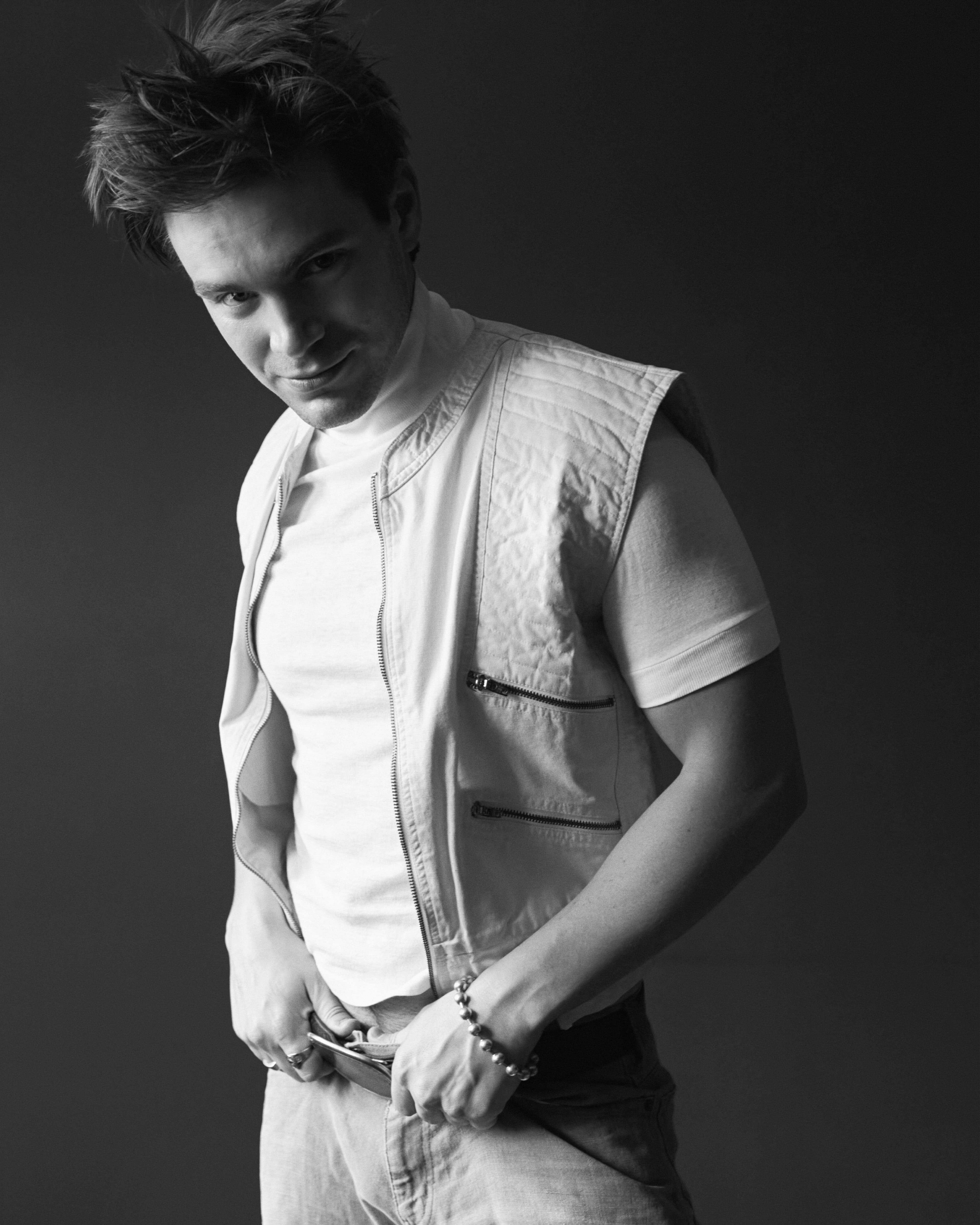
Vintage vest by Bugle Boy from Cherry Vintage. Vintage top from Cherry Vintage. Pants and belt, stylist’s own.
Those questions might sound surprising coming from Burnap, who won the 2021 Tony for Lead Actor in a Play for his incandescent turn as Toby Darling in the two-part epic The Inheritance about contemporary gay life and is now displaying both his emotional and vocal range in Camelot, but the Rhode Island native is an actor of uncommon introspection and curiosity, traits he shares with his latest character. “There’s an earnestness about Arthur that I really connect with,“ Burnap adds. “There’s an idealism that is sort of, in our world today, an act of resistance. The world can be so dark and painful and full of despair. In order to survive in a world like that, I think you have to detach yourself from it and try not to take it too seriously and try to keep hope at bay because if you hope too much, heartbreak soon follows. But Arthur actually wholeheartedly does believe that we can be great and be better and I love that about him. He’s very innocent in that way.“

Vintage vest by Bugle Boy from Cherry Vintage. Vintage top from Cherry Vintage. Pants, stylist’s own.
Camelot marks Burnap’s first time on stage in a musical since his undergraduate years at the University of Rhode Island and his first time performing live since The Inheritance, and he admits it took some convincing for him to return to Broadway after the rigors of his last show, which was over seven hours long. “It takes up your whole life in a way that’s beautiful and fulfilling and you’re always grateful for the work, but it costs a bit,“ he says. The opportunity to work with Bartlett Sher, who directed Lincoln Center Theatre’s popular revivals of South Pacific, The King and I, and My Fair Lady, and Sorkin got him “ninety-nine percent“ on board. Reading the new book sealed the deal: “I thought it was so funny and quick and witty, but also urgent in a new way and necessary and politically urgent.“
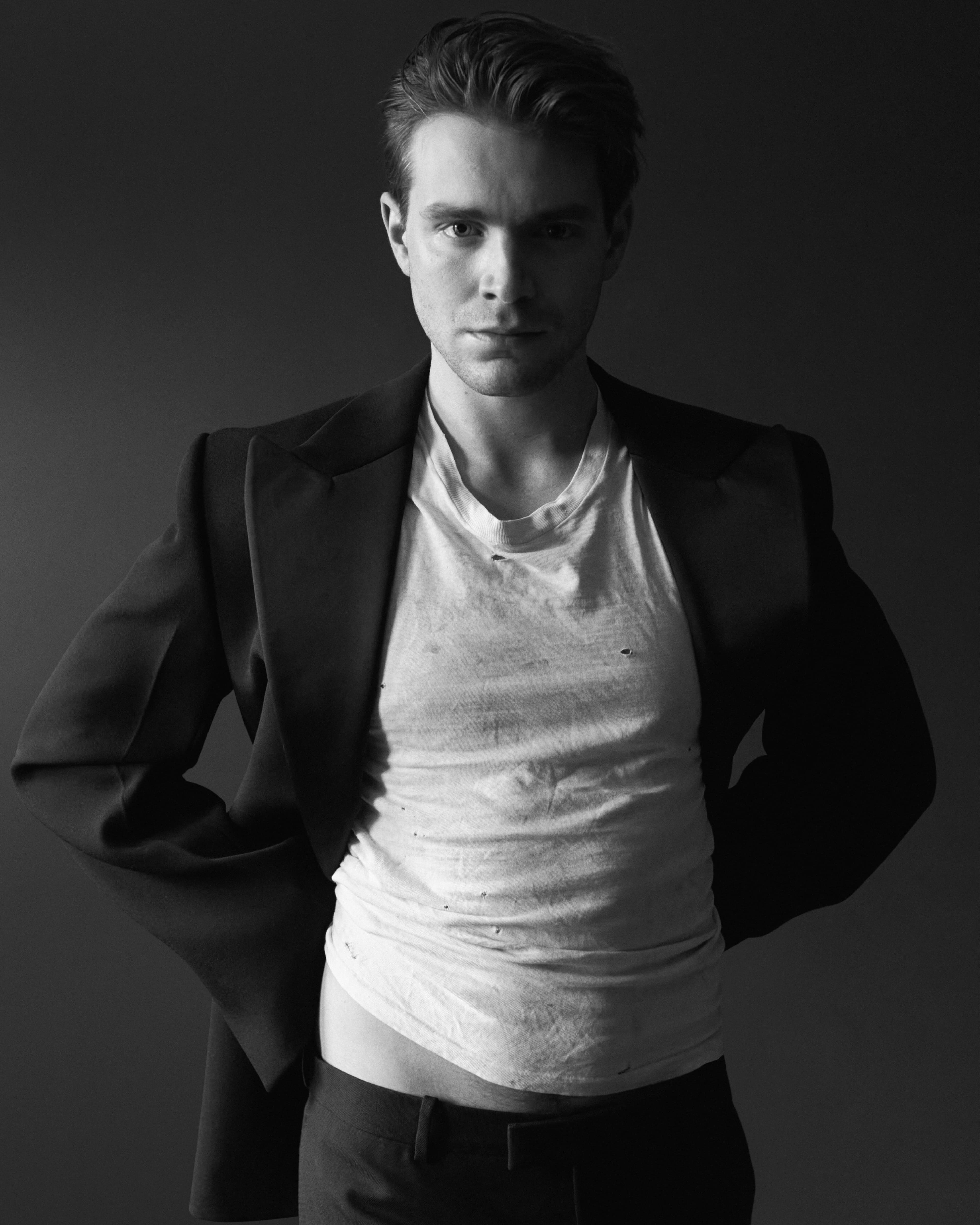
Jacket and pants by Ferragamo. Vintage t-shirt, stylist’s own.
Many of those who are familiar with the original version of Camelot likely remember it as a charming if ultimately frothy and desultory work, with classic songs but a plot that fails to fully cohere. By removing the magical elements, Burnap says, Sorkin sharpened its commentary and raised a number of thorny issues without offering easy solutions. “It makes it about one person who is given power and what he decides to do with it and how it does or does not provide safety nets for society’s most vulnerable people,“ the actor elaborates. “Now it’s fully a political drama that deals with the question we’re still asking today, which is, can we live up to our ideals or will we always give in to the worst of human nature? Arthur I think deals with that in a more urgent way in this book.“
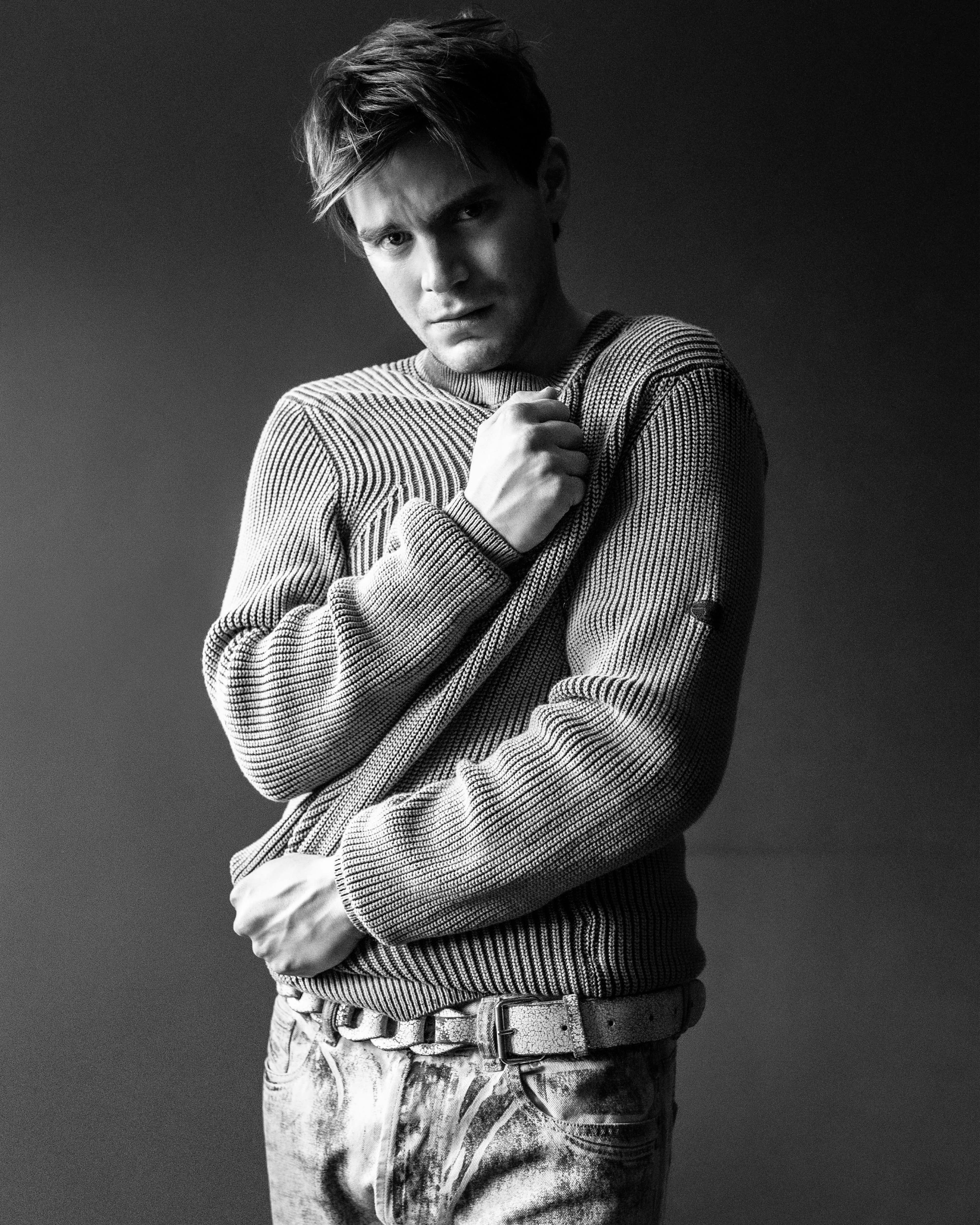
Sweater and jeans by Diesel. Belt, stylist’s own.
Without the magic—Merlin, for example, is now an advisor rather than a wizard—this new Camelot, Burnap says, is no longer a fairy tale but still brims with a sense of hope and optimism, one which is sorely needed in these dark times. “We live in a country now that’s very much grappling with the question of, do this system and these institutions that we put in place and that we’ve put our faith into work? Camelot speaks directly to that,“ he says. “I think there’s a reason why the Kennedy administration became so obsessed with Camelot. I think Kennedy in particular, the youngest man elected to that office, very much sought a better world and sought to shake things up. I think Kennedy had a sense of American idealism that is also true of Arthur.“
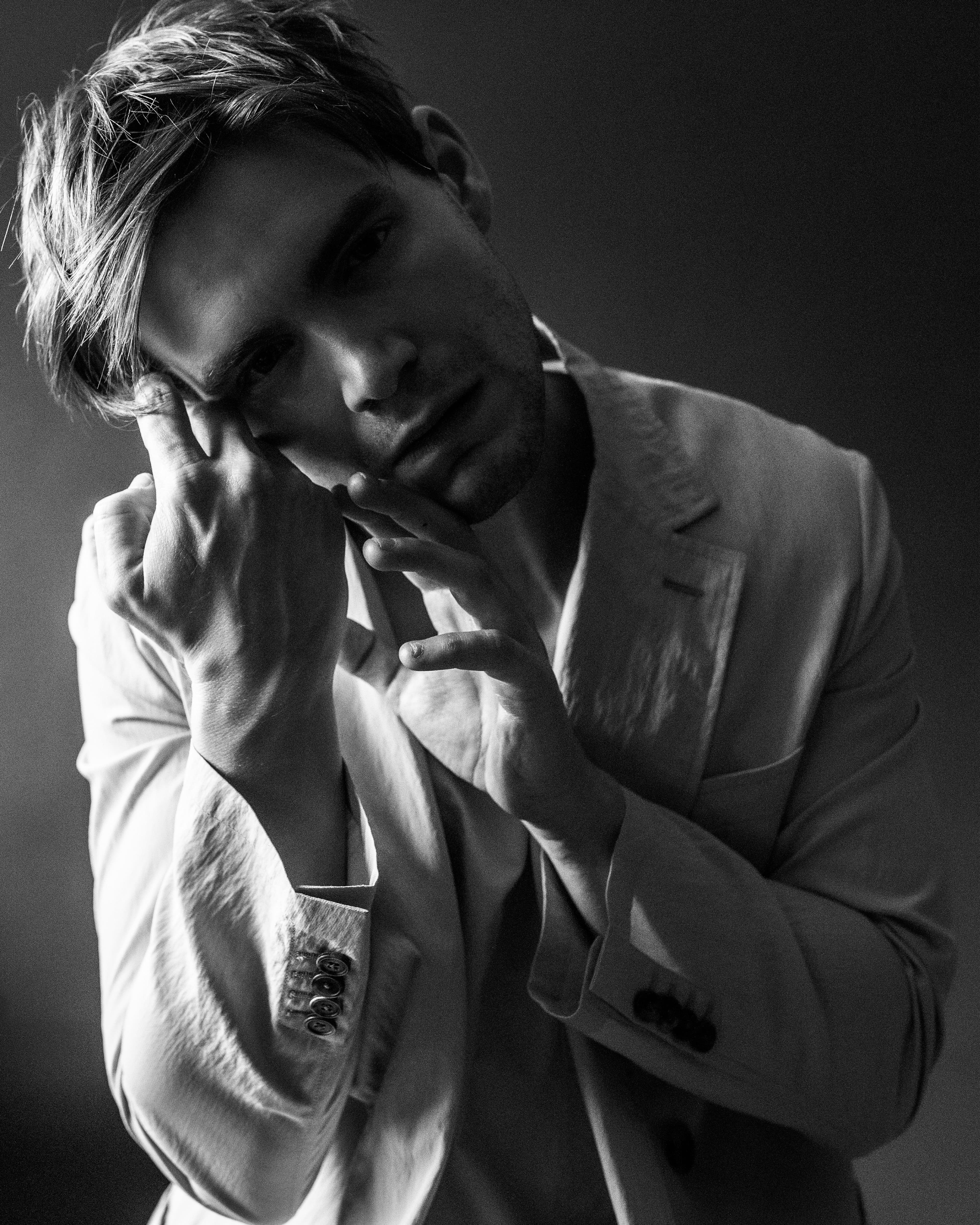
All clothing by Hermès
For Burnap, that combination of clear-eyed candor and a dedication to progress is one of the true purposes of art itself. “I think history is told by those in power and I think when those in power are corrupted, it is left to storytellers to tell and pass down history. I think it’s our job to say, ’This is who we are, this is what we’ve done, this is what we are capable of. Where do we go from here?’“ he says. “I think the only way that we can actually get better is by dealing with the reality of our mistakes and our shortcomings. We’ll always come up short, but we have to wear our shame on our face because if we hide it, we’re bound to make the same mistakes again. If we can come to terms with our true history, we may be able to correct course. It’s difficult and it’s uncomfortable and it’s nasty but it’s our job as artists to say, ’No, this is what we look like, this is our full picture.’ If we accept that, we can move forward in a new way.“

Next year, Burnap will take on his biggest role yet in another updated fairy tale, opposite Rachel Zegler and Gal Gadot as Jonathan, the leading man of Disney’s live action Snow White, whom the actor describes as a “reluctant hero.“ Since his last time on Broadway, he’s also appeared in a number of acclaimed series including Under the Banner of Heaven and WeCrashed, and while he says he will continue to explore film and television, the stage will keep calling him back. “Theater is my first love, it’s where I always want to return to,“ he says. “It’s where some of the most magical moments happen. It’s a unique art form in the sense that the show is the same each night, but it’s wildly different each night. I would love if I could peacefully keel over on my way into the theater when I’m ninety-eight years old.“
Camelot is now playing at the Vivian Beaumont Theater, New York. Read this story and many more in print by ordering our sixth issue here.
As a nonprofit arts and culture publication dedicated to educating, inspiring, and uplifting creatives, Cero Magazine depends on your donations to create stories like these. Please support our work here.
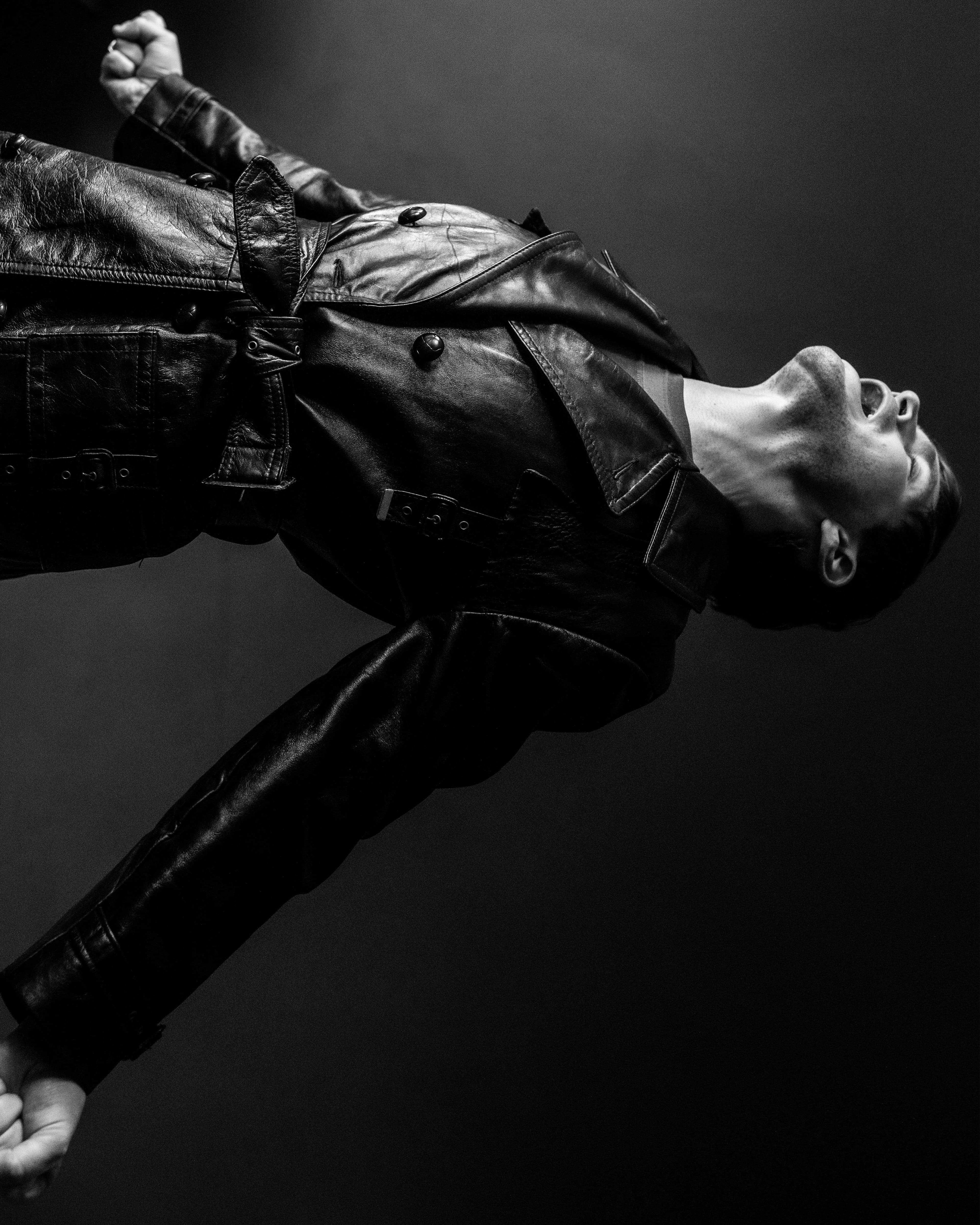
All vintage clothing from Cherry Vintage
As a nonprofit arts and culture publication dedicated to educating, inspiring, and uplifting creatives, Cero Magazine depends on your donations to create stories like these. Please support our work here.






